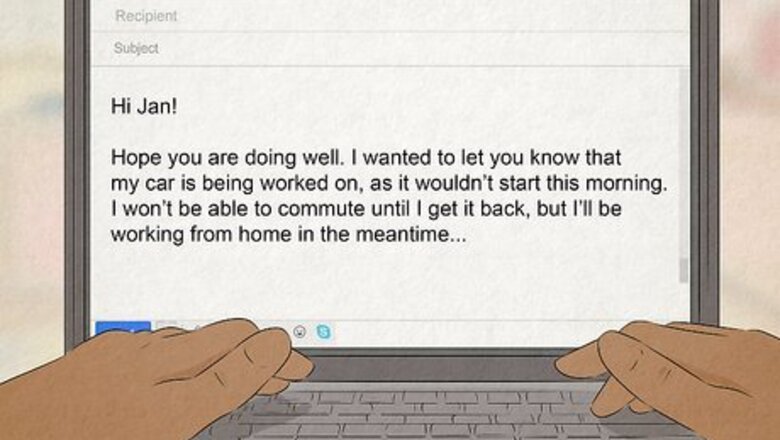
views
- If you need a last-minute excuse to work from home, choose an excuse that your boss is likely to sympathize with, like car troubles or a bad reaction to food.
- For a more permanent excuse to work from home, explain to your boss that remote work is better for your productivity or you need a more flexible schedule.
- There are many advantages to working from home. It can save you time and money from commuting and ensure you have a much comfier working environment.
Last-Minute Excuses
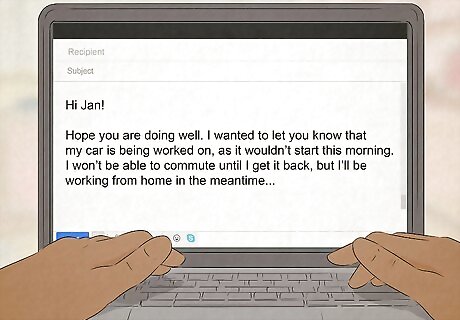
Car trouble Your boss can’t expect you to drive a broken car to work. “Car troubles” is a classic excuse, but it works for a reason: if your vehicle can’t make the commute to work, nobody should expect you to jog there! Let your boss know that your car is acting up, won’t start, has a dead battery or a flat tire, or give another plausible reason why driving isn’t an option for you. For example: “Hi Jan! I wanted to let you know that my car is being worked on, as it wouldn’t start this morning. I won’t be able to commute until I get it back, but I’ll be working from home in the meantime.” This excuse can still work even if you live somewhere with public transportation. You could say, “Since I’m already running late due to car troubles, I thought working from home would be the most productive option.”

Food reaction Bad reactions to food can happen anytime. If you have IBS (irritable bowel syndrome), Celiac disease (gluten intolerance), lactose intolerance, or another condition that causes reactions to food, that can be your ticket for a day at home. Your boss should understand if you tell them you aren’t feeling well, and it’s tough to be in the office when you’re running to the bathroom constantly. For example: “Hi, Fred. I’ll spare you the details, but my Celiac is acting up, and I can’t make it to work. However, I can still work from home today.” “I believe I have food poisoning from dinner last night. I’ll spare you the details, but I don’t think commuting to work is possible today. Still, I’m happy to work from home while I wait for this to run its course.” You don’t need to get specific about symptoms; just tell your boss that you’re having a bad reaction to food, a Celiac attack, or something similar. They can read between the lines!
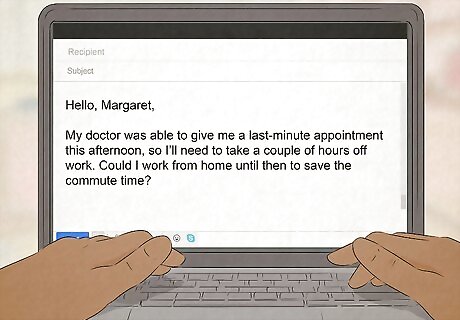
Doctor’s appointment Everyone needs to visit a doctor sooner or later. Between routine checkups to sudden medical issues that might need a doctor’s attention, there are plenty of reasons you might need to make a trip to your primary care doctor, dentist, or another specialized medical professional. Just don’t use the same excuse too often; doctor's visits usually happen yearly, and dental visits occur every 4 to 6 months. And sometimes, doctors appointments come up without warning, which offers you more flexibility. “Hi, Ben. I’m sorry for the short notice, but I just got a call from my doctor about an appointment opening. Once I’m done there, would it be possible to work from home today?” “Hello, Margaret. My doctor was able to give me a last-minute appointment this afternoon, so I’ll need to take a couple of hours off work. Could I work from home until then to save the commute time?” Before you use this excuse, find out if your workplace requires you to submit proof of medical appointments or treatment.

Sickness Nobody wants a contagious coworker around a workplace. If you’re sick, whether you’ve got a cold, flu, or something even more serious like COVID, let your boss know. They legally can’t ask you to come into work if you’re sick—and, since they’ll want to avoid getting sick themselves, they probably won’t want you to come into work anyway. “I have the flu, so I think it’d be best for me to work from home—I don’t want to get anyone else in the office sick. I’ll likely be out for a few days, but I’ll be sure to keep you in the loop and let you know when I expect to be back.” If you’re really sick, concentrating on work might be difficult. It’s also okay to call in sick entirely or take a couple of days off to get through the worst of the illness and then work from home while it runs its course. If you have COVID, be sure to follow the CDC’s current guidelines and check to see if your company has a protocol to follow in the event that an employee gets sick. If you decide to officially call in sick (instead of offering to work from home) be sure to check and see if your work has a sick day limit before using this excuse too many times!

Injury or sudden pain It’s important to rest at home while recovering from an injury. Say you strained your back the day before or pulled a muscle while on a run. Commuting would probably be a painful experience for you (along with any kind of movement, depending on the injury), so your boss should understand that your best option is probably working from home. “Just wanted to let you know that I’ll be waiting in urgent care for at least a couple of hours today, as I woke up with severe back pain. I’m happy to work from my home for now.” “I’m having a bad sciatica flare-up today, and I know from experience that driving to work would be very painful. I’d like to work from home today and likely for another few days until the pain clears up.”
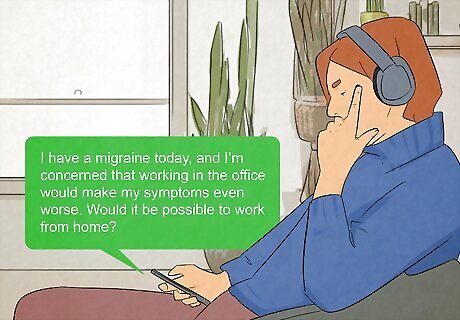
Migraine Bad migraines can leave you feeling weak for days. Your boss shouldn’t expect you to commute in the wake of a bad migraine attack. If you feel a migraine coming on or had one the day before and still feel weak and nauseous, ask to work from home—if you don’t ask to take the day off of work entirely, which is also an option. “I’ve been dealing with a pretty bad migraine since yesterday evening, and I think I would do better work in the peace and quiet of my own home.” “I have a migraine today, and I’m concerned that working in the office would make my symptoms even worse. Would it be possible to work from home?”

Burnout and stress Working from home can protect you from burnout and high stress. Feeling a lot of pressure from work and finding it hard to cope when you need to commute there every day? Tell your boss that you’re suffering from burnout, and need to take a step back by working from home. Burnout is a legitimate condition, so your employer should recognize that and take it seriously. “It’s been a stressful time for me, and my doctor feels that I’m showing symptoms of burnout. If it’s possible, I’d like to work from home for a few days to see if that helps me get back on track.” “I think it’s important for my mental health to take a step back and work from home this week. I can tell I’m starting to burn out and would like to avoid that if I can.”
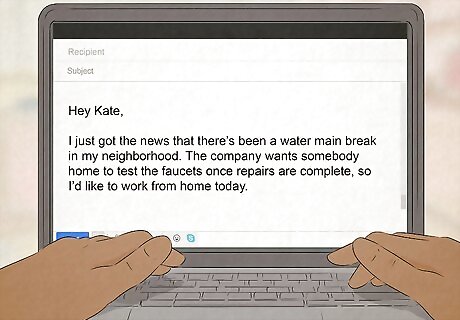
Water leak or main break Your boss should understand if you need to take care of a leaky home. Water damage can be an extremely annoying (and expensive) problem to fix, so claiming that you need to stay home, drain as much water as possible, and call a plumber is a valid excuse. Alternatively, you could say there’s been a water main break, and you need to be home while repairs are ongoing. For example: “Hey Kate, I just got the news that there’s been a water main break in my neighborhood. The company wants somebody home to test the faucets once repairs are complete, so I’d like to work from home today.” “Unfortunately, there’s a nasty leak in my ceiling and water all over my kitchen. Would it be possible to work from home today? I’m happy to stay online while I wait for my plumber to arrive.”

Bad weather There’s no need to drive to work if you’ll just get stuck in a storm. If the weather forecast is predicting some nasty weather later in the day (or it’s already happening), there’s no shame in asking your boss if you can skip the commute. If the storm is already happening, you could say you’re worried it’s unsafe to travel. If it’s going to happen later, you could say you don’t want to get stuck on your way home. “It looks like some pretty heavy rain and sleet is forecasted for later this afternoon, and I wouldn’t feel comfortable making a 30+ minute drive home in that. I’d like to work from home today if that’s all right.” “The roads are pretty icy after last night’s weather, and I’d prefer not to chance driving to work when working from home would save me a lot of time.” Remember that you can only use this excuse when bad weather is in the forecast! Your request won’t be very realistic on a dry, sunny day.

Important delivery Most home deliveries happen between 9 AM and 6 PM on weekdays. When you order something particularly big or valuable, it’s important to be home whenever that item is delivered! You might need to show carriers where to set up some furniture or sign for a valuable new piece of equipment—so you can always tell your boss that you’ll need to be home for that delivery. For example, you could say, “I’m having new furniture delivered between 10 AM and 4 PM tomorrow and need to sign for it, so I’d like to work from home to be safe.” “I’m not sure of the exact time my delivery will arrive, and I’d rather avoid paying extra for a re-delivery. Would it be possible to work from home on Friday?”
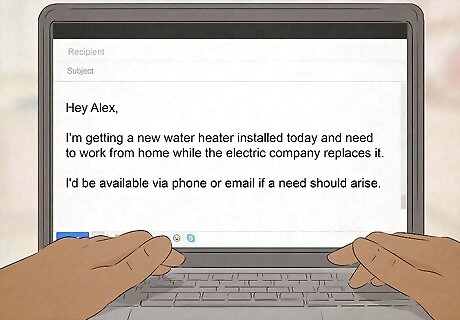
Getting work done on your house It’s normal to stay and supervise while work is done on your home. Typically, homeowners need to be present while their homes get repairs (or other work done). You might need an HVAC expert to take a look at your malfunctioning air conditioning system, or a contractor may be installing wood floors in your home, for example. “Hey Alex, I’m getting a new water heater installed today and need to work from home while the electric company replaces it.” “I’ll be working from home today, as workers are coming to replace the rug in my living room and I need to let them inside.”
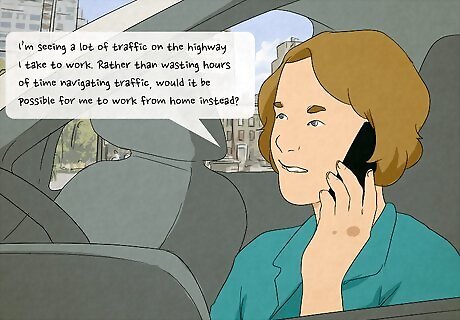
Bad traffic Why commute when you’ll sit in traffic for an hour anyway? If you notice that there’s bad traffic along your route to work, you could let your boss know and ask to work from home instead. Your boss should be able to see the sense in working from home, especially since it’ll allow you to get more work done. Just verify there’s actually traffic first since this is something your boss can easily check themselves. “I’m seeing a lot of traffic on the highway I take to work. Rather than wasting hours of time navigating traffic, would it be possible for me to work from home instead?”
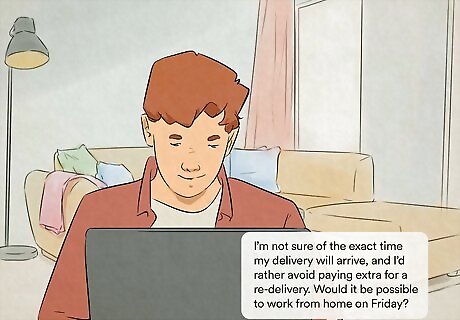
Family emergency Few people will question a family emergency excuse. That’s why it’s such a reliable excuse: you aren’t obligated to get into specifics, yet a “family emergency” is serious enough that your boss should let you work from home without much fuss. “Family emergency” is also vague enough to refer to just about any issue that might arise, from an injury to a family member needing help with something. “A family emergency has come up, and I’d like to take today to deal with that. However, I can still work a couple of hours from home if that’s all right.” If you do mention the emergency, you don’t have to include too many details. You could just say, “My grandmother needs a ride to the doctor today, and I’ll be helping her out. Is it all right if I work from home in the meantime?”
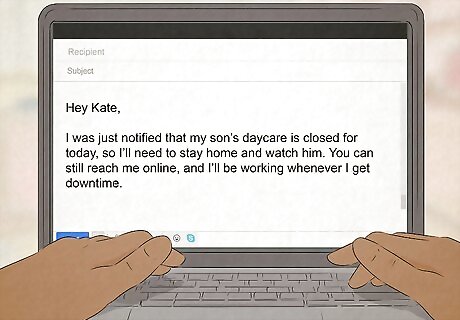
No childcare If your child doesn’t have a place to go, you’ll need to care for them. Childcare is critical for working parents because it ensures that their children have a place to go when they work. If your child’s daycare can’t take them for whatever reason (staff emergency, broken heat or air conditioning, and so on), you can absolutely let your boss know that you need to watch your child. For example: “I was just notified that my son’s daycare is closed for today, so I’ll need to stay home and watch him. You can still reach me online, and I’ll be working whenever I get downtime.”
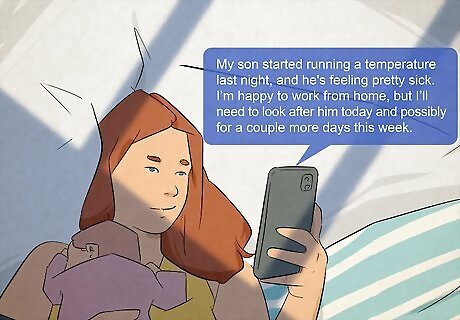
Sick child Tell your boss that you need to care for your sick child. If your child has a doctor’s appointment or hasn’t been feeling well for a couple of days, you could say that you need to work from home in order to look after them. Just remember that while this is a convincing excuse, it’s best not to use it too often. Life happens, and you never know when your child might actually get sick. Try something like, “So sorry for the short notice, but I can’t make it to work today. My daughter is sick, and I need to take care of her. I plan to work from home and will still be online if you need to reach out for anything.” "My son started running a temperature last night, and he's feeling pretty sick. I'm happy to work from home, but I'll need to look after him today and possibly for a couple more days this week."
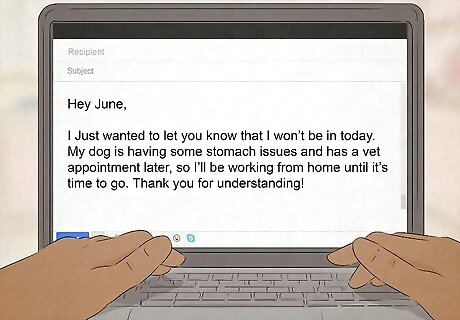
Sick pet Don’t have any kids? You could say that your pet (dog, cat, rabbit, and so on) is sick or injured. Pets are beloved family members, and it can be really stressful when they’re feeling under the weather, so your boss should understand if you tell them you’ll be spending the day working at home and monitoring your pet. “My cat isn’t acting like herself today, and I think she’s sick. I’m bringing her to the emergency vet now, and if it’s all right, I’d like to work from home after so I can keep an eye on her.” “Just wanted to let you know that I won’t be in today. My dog is having some stomach issues and has a vet appointment later, so I’ll be working from home until it’s time to go. Thank you for understanding!” You could work from home after the death of a pet. For example, “My dog passed away this weekend, and I’m still grieving. I’d like to work from home for a few days while I process.” Just remember to use that excuse very sparingly.

Death in the family A death in the family is always an excuse to stay home for a while. It’s natural to need to grieve after the death of a loved one—and commuting to a workplace can be an unnecessary obstacle in the grieving process. Let your boss know that you’re dealing with a loss and aren’t in the right mindset to work in the office currently; they should understand right away. “I wanted to let you know that my grandfather passed away over the weekend, and I don’t think I’m in a good frame of mind to work in the office right now. Would it be possible to work from home this week?” Remember, you can also take time off in the wake of a loved one’s death. Check and see if your workplace offers bereavement leave, which can be provided to employees who have lost a loved one.
Long-Term Work from Home Excuses

Reducing your commute time You may be allowed to work from home to save time and increase productivity. If you’ve got a long commute to and from work (say, 30+ minutes one way), it can feel like a pointless way to waste your time and money when you could just work from home. In fact, if you point that out to your boss, they may let you work from home so long as it helps you be productive. “Would you be open to the idea of me working from home a couple of days each week? I think it would really help me get a jump on my projects since I won’t be spending 45 minutes driving to and from work.”
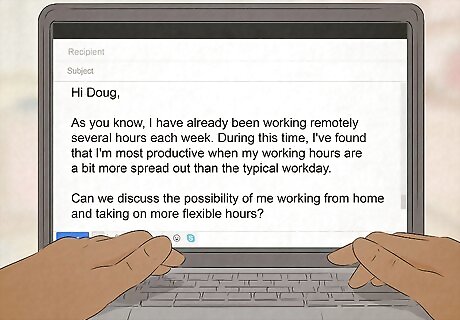
Need a flexible schedule Some people are more productive when they get to make their own schedule instead of sticking to the traditional 9 AM to 5 PM routine. If you feel like you might also benefit from a little flexibility, approach your boss and explain why you’ll become a happier and more productive employee if you can work from home and set your own schedule. This excuse can work so long as your boss gets results! “I think a more flexible schedule would be really helpful for me in terms of productivity. I’d love to discuss what a more permanent work-from-home arrangement might look like.” “In my experience, I'm most productive when my working hours are a bit more spread out than the typical workday. Can we discuss the possibility of me working from home and taking on more flexible hours?”

Better concentration Explain to your boss that you can concentrate on work better at home than in the workplace. At home, everything is nice and quiet—perfect for doing remote work. In the office, there’s background noise, coworkers who might interrupt you periodically, and an altogether busier atmosphere. In fact, your boss may be impressed with your dedication to focusing and doing better work! “I was wondering if we could discuss the possibility of a permanent work-from-home situation. The few times I’ve done it in the past, it’s done wonders for my concentration, and I think it would be a good change for me.” “I think remote work may help me focus better on my work and guarantee I get things done without interruption. Could we discuss the possibility of a permanent change to working from home?” EXPERT TIP Ashley Moon, MA Ashley Moon, MA Professional Organizer Ashley Moon is the Founder and CEO of Creatively Neat, a virtual organizing and life coaching business based in Los Angeles, California. In addition to helping people organize their best life, she has a fabulous team of organizers ready to de-clutter your home or business. Ashley hosts workshops and speaking engagements at various venues and festivals. She has trained with Coach Approach and Heart Core for organizing and business coaching respectively. She has an MA in Human Development and Social Change from Pacific Oaks College. Ashley Moon, MA Ashley Moon, MA Professional Organizer Define spaces in your office clearly. Keep your workspace organized by finding consistent homes for office supplies and electronics. If possible, demarcate the boundaries of your home office space with furniture, shelves, or room dividers, to promote focus and keep a clear division between work and home.

Focusing on mental health If one mental health day at home just isn’t enough, you may be able to petition your boss for a part-time or permanent work-from-home schedule based on your needs. Explain that working from home and being surrounded by a familiar, comforting environment can cut a lot of stress out of your daily work life and help you be a more productive employee. “After a lot of consideration, I think the best option for my mental health would be a part-time or permanent work-from-home arrangement. I think it’d be much less stressful for me and increase my productivity as a result. “I’d like to talk about creating a permanent work-from-home schedule for myself. I’ve been trying to better manage my mental health recently, and I find I can do that—and get more work done—when working remotely.”

















Comments
0 comment